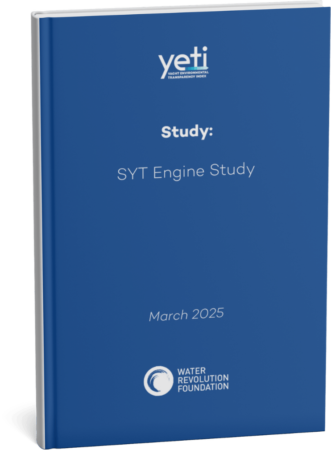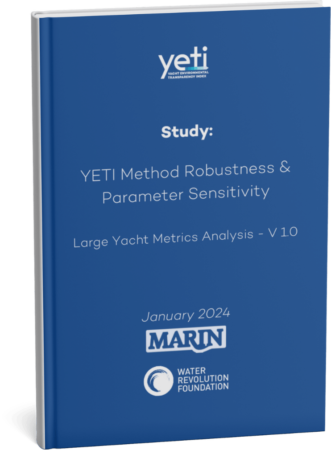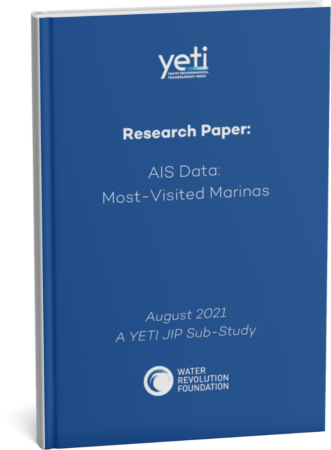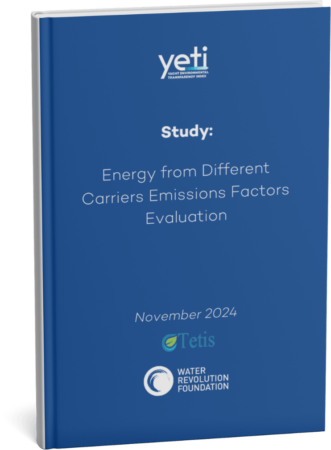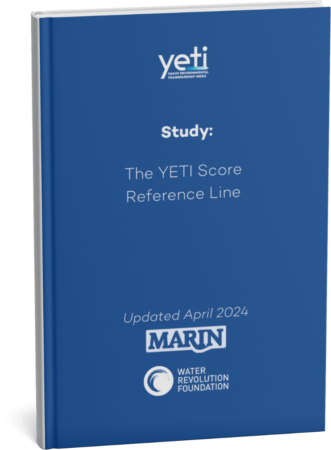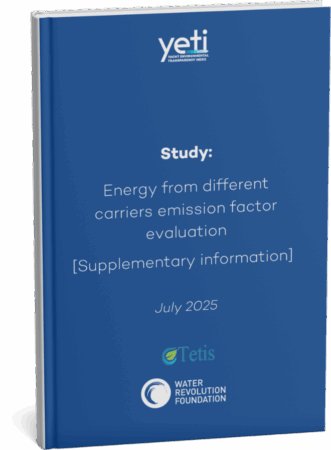About
The Method
YETI assesses the impact of large motor and sailing yachts (30m+) by benchmarking them against the average operational profile that they have been found to have in common. The outcome is a single score, meant to instantly understand where the vessel stands, how it compares to the rest of the fleet, why that is the case, and what opportunities there are to improve its environmental performance. It is not intended as an alternative for legislative developments such as EEDI, EEXI, CII, etc., going beyond CO2 impact and based on the Life Cycle Approach.
YETI introduces a new term for the industry to express environmental impact: EcoPoints. This allows us to calculate the various effects of CO2, CO, HC, NOx, Ammonia, & PM 2.5 in one single number. Specific impacts are also reported separately, to allow for transparency and steering on a selection of them (e.g. CO2 equivalent, which is common with the focus of regulatory bodies).
The Experts
Water Revolution Foundation is a non-profit organisation, started from within the yachting sector to drive environmental sustainability through collaboration and innovation. The foundation advocates and facilitates a transformative approach for the industry to reduce its ecological footprint and preserve the precious oceans. One of its flagship initiatives is YETI, a sector specific, proactive approach, developed to help achieve these goals.
As a joint industry project, the Foundation brings together renowned new build and refit shipyards, naval architecture studios, and research institutes to co-create YETI’s science-based, data-driven protocol. With combined industry and environmental expertise and data, the group has statistically found an average operational profile, conducted a shore power study, assessed the upstream impacts of diesel, worked on a database of the most commonly used engines and generators with emission data from manufacturers, and developed a “sail correction.”
The Future
ISO/TS 23099 has now been formally approved by ISO – a harmonised, science-based framework for assessing and comparing yacht environmental performance. YETI’s Joint Industry Project served as the scientific and methodological foundation that informed this Technical Specification, bringing together collaborative, data driven input from across the industry.
We aim for the entire global fleet to be calculated using YETI Pro, with scores validated by a third-party for official certification, ensuring complete transparency.
Moving forward, we will also expand on an environmental upgrade programme in the refit sector, incentivising and recognising voluntary efforts to improve the environmental performance of existing yachts. This initiative will help reduce the overall environmental impact of the entire fleet, complementing the ambitious goals set for new yacht builds.
The Method
YETI assesses the impact of large motor and sailing yachts (30m+) by benchmarking them against the average operational profile that they have been found to have in common. The outcome is a single score, meant to instantly understand where the vessel stands, how it compares to the rest of the fleet, why that is the case, and what opportunities there are to improve its environmental performance. It is not intended as an alternative for legislative developments such as EEDI, EEXI, CII, etc., going beyond CO2 impact and based on the Life Cycle Approach.
YETI introduces a new term for the industry to express environmental impact: EcoPoints. This allows us to calculate the various effects of CO2, CO, HC, NOx, Ammonia, & PM 2.5 in one single number. Specific impacts are also reported separately, to allow for transparency and steering on a selection of them (e.g. CO2 equivalent, which is common with the focus of regulatory bodies).
The Experts
Water Revolution Foundation is a non-profit organisation, started from within the yachting sector to drive environmental sustainability through collaboration and innovation. The foundation advocates and facilitates a transformative approach for the industry to reduce its ecological footprint and preserve the precious oceans. One of its flagship initiatives is YETI, a sector specific, proactive approach, developed to help achieve these goals.
As a joint industry project, the Foundation brings together renowned new build and refit shipyards, naval architecture studios, and research institutes to co-create YETI’s science-based, data-driven protocol. With combined industry and environmental expertise and data, the group has statistically found an average operational profile, conducted a shore power study, assessed the upstream impacts of diesel, worked on a database of the most commonly used engines and generators with emission data from manufacturers, and developed a “sail correction.”
The Future
ISO/TS 23099 has now been formally approved by ISO – a harmonised, science-based framework for assessing and comparing yacht environmental performance. YETI’s Joint Industry Project served as the scientific and methodological foundation that informed this Technical Specification, bringing together collaborative, data driven input from across the industry.
We aim for the entire global fleet to be calculated using YETI Pro, with scores validated by a third-party for official certification, ensuring complete transparency.
Moving forward, we will also expand on an environmental upgrade programme in the refit sector, incentivising and recognising voluntary efforts to improve the environmental performance of existing yachts. This initiative will help reduce the overall environmental impact of the entire fleet, complementing the ambitious goals set for new yacht builds.
Timeline of YETI Development
Bram Jongepier of Feadship – De Voogt Naval Architects conceived the idea to develop YETI
2018
YETI became a joint industry project with key members of the industry joining the collaboration
2019
The average operational profile of yachts was analysed & defined based on AIS study with 297 years of data from over 100 yachts
2020
A “sail correction” was developed, shore power study conducted, & upstream diesel assessed as part of a yacht’s operational impact
2021




2022
An engine & generator study was developed for YETI database, fleet review conducted for 60 yachts, YETI 1.0 launched
2023
CO2 equivalent converter was added to track GHG impact, method defined to obtain reference line of the world’s fleet as a benchmark
2024
Environmental factors updated, reference line developed, YETI software launched, ISO process to submit the YETI method as an industry standard begun
2026
Milestone achievement: ISO approves ISO/TS 23099, the Technical Specification informed by the YETI Joint Industry Project.
2018
Bram Jongepier of Feadship – De Voogt Naval Architects conceived the idea to develop YETI
2019
YETI became a joint industry project with key members of the industry joining the collaboration
2020
The average operational profile of yachts was analysed & defined based on AIS study with 297 years of data from over 100 yachts




2021
A “sail correction” was developed, shore power study conducted, & upstream diesel assessed as part of a yacht’s operational impact
2022
An engine & generator study was developed for YETI database, fleet review conducted for 60 yachts, YETI 1.0 launched
2023
CO2 equivalent converter was added to track GHG impact, method defined to obtain reference line of the world’s fleet as a benchmark
2024
Environmental factors updated, reference line developed, YETI software launched, ISO process to submit the YETI method as an industry standard begun
YETI Webinar Series
The YETI Webinar Series guides you through the background, scientific approach, and practical application of YETI. Whether land-based professional or crew member, this 5-part series offers an in-depth look at YETI’s development and provides the knowledge needed to begin making concrete, practical changes within your fleet in order to future-proof the yachting sector as a whole. Sign up below to watch all five episodes.
Click for a snippet of Episode 1
Knowledge Hub: Sub-Studies & Research
These papers, sub-studies and research have been conducted in support of the development of the Yacht Environmental Transparency Index (YETI) by a Joint Industry Project (JIP) organised through Water Revolution Foundation, and in close collaboration with MARIN (Marine Research Institute Netherlands).
A shared motivation to educate on and visualize impacts and solutions has driven their efforts to develop this tool and formed the basis for the research presented below.
Click on the report to download.
Testimonials
It is a long established fact that a reader will be distracted by the readable content of a page when looking at its layout. The point of using Lorem Ipsum is that it has a more-or-less normal distribution of letters, as opposed to using ‘Content here, content here’, making it look like readable English.
Julie Anderson
The standard chunk of Lorem Ipsum used since the 1500s is reproduced below for those interested. Sections 1.10.32 and 1.10.33 from “de Finibus Bonorum et Malorum” by Cicero are also reproduced in their exact original form, accompanied by English versions from the 1914 translation by H. Rackham.
H. Rackham
Lorem Ipsum is simply dummy text of the printing and typesetting industry. Lorem Ipsum has been the industry’s standard dummy text ever since the 1500s, when an unknown printer took a galley of type and scrambled it to make a type specimen book. It has survived not only five centuries, but also the leap into electronic typesetting, remaining essentially unchanged. It was popularised in the 1960s with the release of Letraset sheets containing Lorem Ipsum passages, and more recently with desktop publishing software like Aldus PageMaker including versions of Lorem Ipsum.

